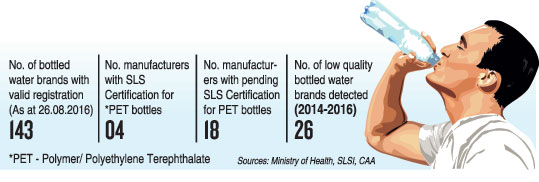News
18 water bottle makers risk local standards non-compliance
View(s):By Sandun Jayawardana
Only four companies manufacturing plastic water bottles have obtained the required SLS certification issued by the Sri Lanka Standards Institution (SLSI), despite it now being more than a year since the authorities notified companies to do so, the Sunday Times learns.
The revelations come as the Consumer Affairs Authority (CAA) prepares to enforce mineral water bottling standards from Tuesday.
Sri Lanka Standard Specification for containers made of polymer (plastic) materials for packaging of drinking water is SLS 1336:2008.
Director General of SLSI, Gamini Dharmawardena, revealed that only four companies have this certification to produce polymer/polyethylene terephthalate (PET) bottles to package water. A further 18 companies have applied. The SLSI will appeal to the CAA to give a grace period of six months to these 18 companies to produce PET bottles until their applications are assessed by the SLSI, Mr Dharmawardena said.
The SLSI requirement had been gazetted last year under Gazette Extraordinary 1918/18 dated June 11, 2015. Accordingly, all producers, distributors and traders of bottled drinking water were directed by the CAA not to “produce, distribute, transport, store, sell or display for sale, expose for sale or offer for sale, wholesale or retail any packaged drinking water in containers made of polymer materials unless such containers/bottles bear the SLS product certification mark issued by the Sri Lanka Standards Institution.” The direction is due to come into effect on Tuesday.
“The companies were given sufficient notice by our authority, but they wait for the last week or the last day to make a formal application,” claimed Hasitha Tilekeratne, CAA chairman. He added the authority was not agreeable to giving a blanket grace period for companies whose applications are still pending at the SLSI. Each company will be assessed individually to see whether applications had been made on time, or whether the company “was playing ball games” with the CAA, the chairman emphasized.
According to the Ministry of Industry and Commerce, 26 mineral water brands were detected by the CAA selling water in bottles of questionable quality during 2014 and 2015. Substandard bottles could negatively affect the quality of the water.
CAA’s Director of Consumer Affairs and Information, Chandrika Thilakarathne, explained that several parameters were considered when awarding the SLS certification for water bottles. These include the thickness of the bottle, whether it is made from virgin polymer materials and whether is has been certified internationally as ‘food grade’ and has the logo to prove it. The bottles must also be able to store water for at least 30 days without any odor emanating from it or the water changing colour.
By law, all bottled water brands must be registered with the Health Ministry’s Food Control Administration Unit. So far 143 mineral water brands are registered with the ministry. While a few companies manufacture their own bottles, the rest purchase bottles from elsewhere.
“The irony of this gazette notification is that we as bottled water manufacturers are being penalized for somebody else’s standards,” lamented Anura Kumarasinghe, chairman of American Premium Water Systems (Pvt) Ltd. Mr Kumarasinghe, who is also president of the Sri Lanka Bottled Water Association, said they have made an appeal to the director general of the CAA for an urgent discussion.
Mr Kumarasinghe observed that bottled water producers had already purchased large stocks bottles from manufacturers. Also, a large number of water bottles that do not have the SLS certification are in the market with distributors and in shops. “We are not opposed to the gazette notification, but we are asking them to give us more time so that we can get SLS certification.”
Question marks also hang over large 19 liter water bottles. These bottles are recycled as much as 50-60 times. Some of these bottles are also imported. Whether an SLS certification can be obtained for them was uncertain, Mr Kumarasinghe pointed out. As such, a proposal will be made to exempt them from SLS certification.


